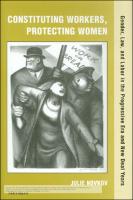Constituting Works, Protecting Women
External Review of Whole Manuscript
Gender, Law, and Labor in the Progressive Era and New Deal Years
Author(s)
Novkov, Julie
Collection
Big Ten Open BooksLanguage
EnglishAbstract
Constitutional considerations of protective laws for women were the analytical battlefield on which the legal community reworked the balance between private liberty and the state's authority to regulate. Julie Novkov focuses on the importance of gender as an analytical category for the legal system. During the Progressive Era and New Deal, courts often invalidated generalized protective legislation, but frequently upheld measures that limited women's terms and conditions of labor. The book explores the reasoning in such cases that were decided between 1873 and 1937. By analyzing all reported opinion on the state and federal level, as well as materials from the women's movement and briefs filed in the U.S. Supreme Court, the study demonstrates that considerations of cases involving women's measures ultimately came to drive the development of doctrine. The study combines historical institutionalism and feminism to address constitutional interpretation, showing that an analysis of conflict over the meaning of legal categories provides a deeper understanding of constitutional development. In doing so, it rejects purely political interpretations of the so-called Lochner era, in which the courts invalidated many legislative efforts to ameliorate the worst effects of capitalism. By addressing the dynamic interactions among interested laypersons, attorneys, and judges, it demonstrates that no individuals or institutions have complete control over the generation of constitutional meaning.
Keywords
Law; History - American History; Political Science - American Politics; Gender Studies - Women's Studies; Class StudiesDOI
10.3998/mpub.17391ISBN
9780472904211, 9780472111985, 9780472904211, 9780472904211Publisher
University of Michigan PressPublisher website
https://www.press.umich.edu/Publication date and place
Ann Arbor, 2001Classification
Gender studies, gender groups


 Download
Download Download
Download